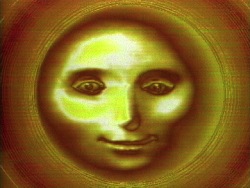Ed Emshwiller
Biography
Ed Emshwiller is a major figure in the history of video art. As both an artist and a teacher, his pioneering efforts to develop an alternative technological language in video were enormously influential. He was an architect of the medium's electronic vocabulary and one of its most accomplished practitioners.
Emshwiller investigated the expressive capabilities of video synthesizers and computer systems while demonstrating an impulse to explore the humanistic potential and transformative properties of the medium, merging the technological with the personal and the symbolic. Through his work with emergent video technologies, articulated in such seminal tapes as Scape-mates (1972) and Sunstone (1979), Emshwiller introduced strategies that defined a new grammar of electronic image-making.
His early experiments with synthesizers and computers included the electronic rendering of three-dimensional space; the interplay of illusion and reality; and manipulations of time, movement and scale — exercises that now read as a primer of the visual and technological strategies that influenced a generation of early videomakers.
Emshwiller came to video from Abstract Expressionist painting, science fiction illustration, and film. As a filmmaker, he established his place in the American avant-garde cinema with such works as Relativity (1966) and Image, Flesh and Voice (1969). His early films featured collaborations with dancers and choreographers, a theme that was continued in his video works, which often include elements of dance, performance and theater.
Emshwiller was born in 1925 and died in 1990. He earned a Bachelor of Design Degree from the University of Michigan in 1949, and studied graphics at the Ecole des Beaux-Arts, Paris, and the Arts Student League in New York. Emshwiller was the 1986 recipient of the American Film Institute's Maya Deren Award, and received numerous other awards throughout his career, including grants from the Ford Foundation, the Guggenheim Foundation, the National Endowment for the Arts, and the New York State Council on the Arts. He taught at Yale University, the University of California at Berkeley, and the State University of New York in Buffalo, among other institutions. Emshwiller also acted as Dean of the School of Film and Video at the California Institute of the Arts. An artist-in-residence at the Television Laboratory at WNET/Thirteen, New York, he was also a Ford Foundation research fellow at the Center for Music Research, University of California at San Diego. His video works have been broadcast and exhibited internationally, at festivals and institutions including the Whitney Museum of American Art, New York; United States Cultural Centers in Japan and Paris; Everson Museum, Syracuse; Sao Paulo Biennale; International Film Festival Rotterdam; Berlin Film Festival; Documenta 6, Kassel, Germany; and The Museum of Modern Art, New York.
